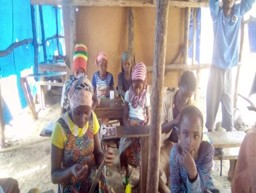In the heart of Guinea Conakry lies a treasure trove of potential waiting to be unlocked: the minds of its children. As the sun rises over bustling markets and verdant landscapes, it illuminates not just the beauty of this West African nation, but also the promise of a brighter future through education. In Guinea, childhood education is not just a path to personal growth; it is a cornerstone of development and progress for the entire nation.
Photos Credit: Aminatou Diallo
The Current Landscape:
Guinea Conakry, like many countries in the region, faces significant challenges in its education sector. Access to quality education remains unequal, particularly in rural areas where 62% of the population live and infrastructure and resources remain scarce. The World Bank reports that among children who start primary school education approximately 63% (two thirds) of them manage to complete it, with disparities widening based on gender and socioeconomic status. According to the former ministre de l'education nationale et de l'alphabetisation, Mr. Guillaume Hawing, there are currently 1080 public school hangars including 1066 at the primary level, 2058 schools with no sanitation infrastructure, 5710 schools without water points, localities without schools, schools without fences in urban areas and school construction sites left unfinished for several years.
Photos Credit: Hassatou Lamarana Bah, Keita Mamadou Bailo and VisionGuinee
The Power of Education:
Education transcends the confines of classrooms, it empowers individuals, strengthens communities, and drives economic growth. In Guinea Investing in childhood education is not just a moral imperative but a strategic necessity. It equips children with the skills and knowledge needed to navigate an ever-changing world, fostering innovation and resilience. Moreover, education promotes social cohesion and stability, laying the foundation for a more inclusive society where every child has the chance to contribute and succeed.
Challenges and Opportunities:
At the present time, there are very few public schools and existing ones are in a dilapidated condition. Many schools, especially in rural areas, lack adequate facilities and resources.
In addition, the average classroom in Guinea has about 80 students per teacher, making it challenging to provide quality education. What is more, the education budget has been declining since 2020, reaching 10.2% of the national budget, which is below the international standard of 20%. As for quality education, in 2019, only 45% of students who completed primary school demonstrated satisfactory proficiency in reading and 32% exhibited sufficient skills in mathematics.
Obstacles like economic barriers, infrastructure issues and teacher shortage perpetuate a cycle of poverty and limited opportunity, hindering the country’s ability to thrive in an increasingly globalized world. About half of the children in Guinea live in poor households, making it difficult for families to afford education-related expenses.
Addressing the educational challenges in Guinea requires a multifaceted approach. Infrastructure development, teacher training, curriculum reform, and community engagement are critical components in expanding access and improving quality. Initiatives to promote girls’ education and reduce barriers for marginalized groups are also essential to ensure that no child is left behind.
Yet, amidst these challenges lie remarkable opportunities. Guinea is rich in cultural diversity and natural resources, offering unique platform to integrate indigenous knowledge with modern educational practices such as coding and technological. By harnessing this potential, the country can foster a generation of critical thinkers and problem solvers who are prepared to lead Guinea into a prosperous future.
Call to Action
Realizing the full potential of childhood education in Guinea requires a collective action. Governments, civil society organizations, international partners and local communities must collaborate to prioritize education as a fundamental human right and a catalyst to sustainable development. Investment in education is an investment in the future-a future where every child in Guinea has the opportunity to fulfill their potential and contribute meaningfully to society. As the sun sets over the vibrant landscapes of Guinea, let us envision a tomorrow where every child dreams are within reach.
At Emry, we are working to make sure no child is left behind. Join us in our mission to inspire and empower the next generation of future leaders. Together, we can make a difference, one child at a time and build a nation where knowledge empowers, hope flourishes and the promise of a brighter future becomes a reality for all.
Thank you for reading and stay tuned for our next post!











